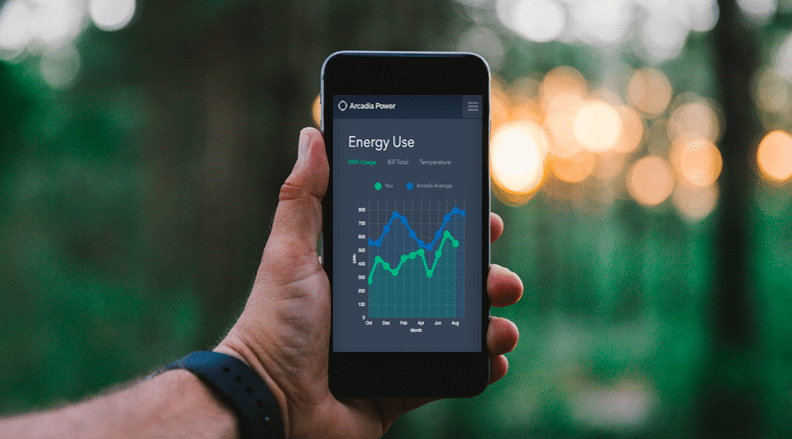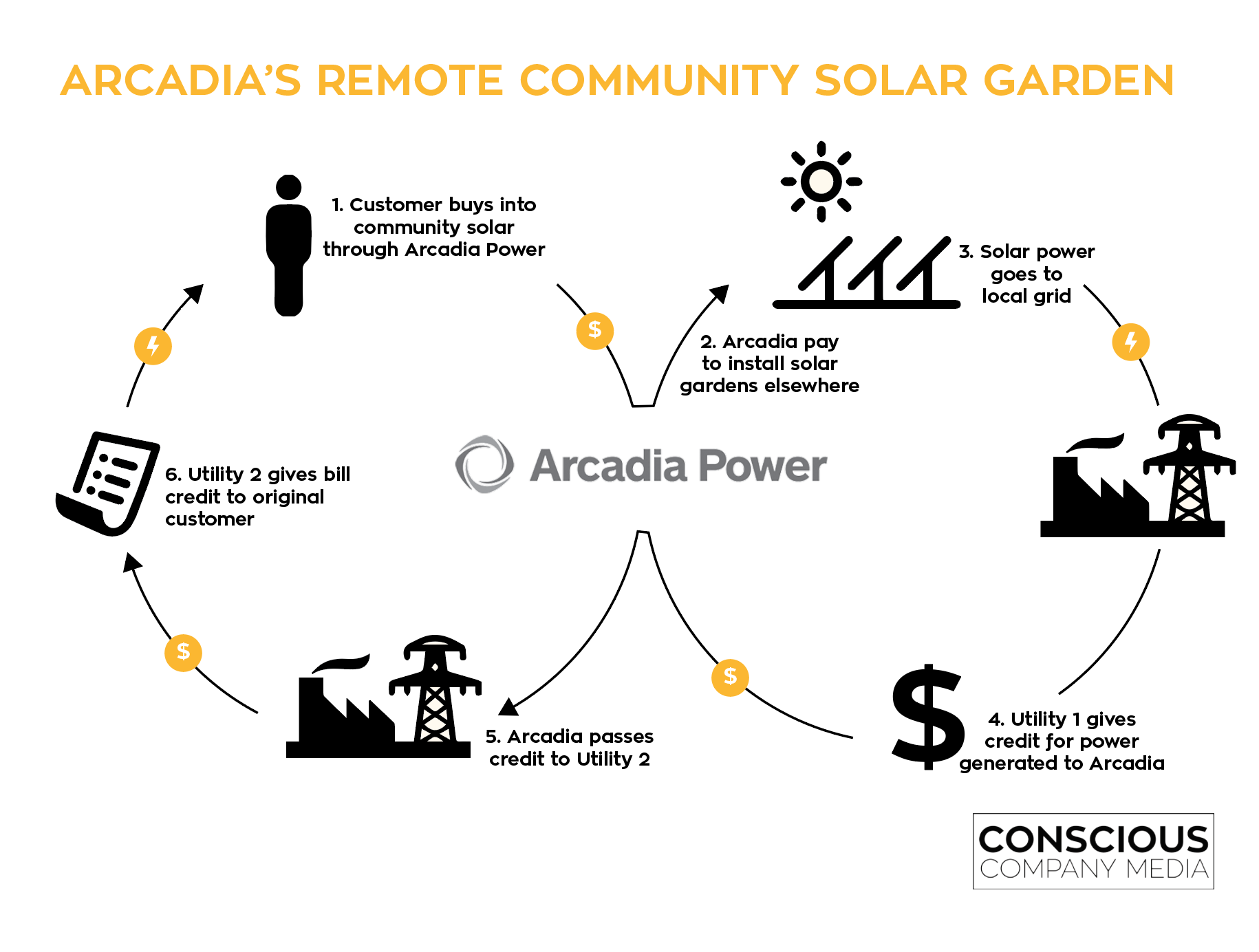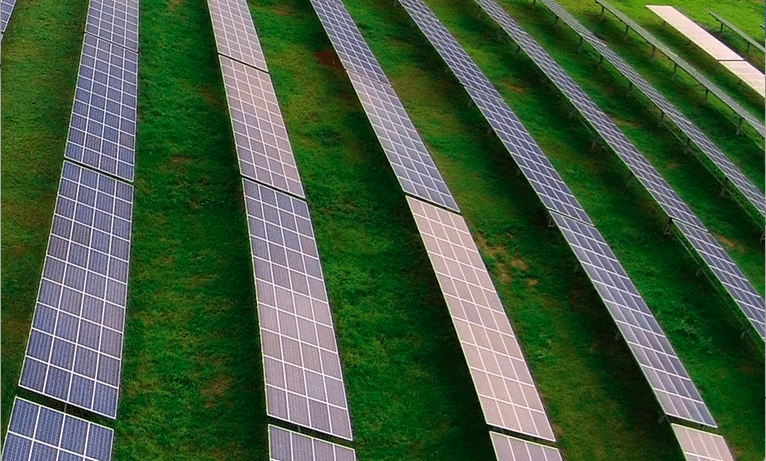Every day, consumers make choices about dozens, if not hundreds, of products and services. In addition to traditional decision-making criteria like price and convenience, consumers are increasingly valuing factors like environmental sustainability and social responsibility. But there’s one huge service that almost everyone buys, yet almost no one makes conscious purchasing decisions about: residential energy.
“The utility industry is one of the last monopolistic consumer industries left,” says Kiran Bhatraju, CEO and co-founder of Washington, DC-based energy technology startup Arcadia Power. “People often don’t have choices. They pay this bill every month, probably for their entire lives, and they really have no idea what they’re paying for other than having the lights on.”
According to a 2016 Pew Research Report, more than 80 percent of Americans favor increasing production of renewable energy like wind and solar power. Yet when it comes to residential renewable energy, there just haven’t been that many options for consumers — only 4 percent of Americans report having home solar panels, for example, and that is probably the most common option consumers know about.
“Arcadia Power is trying to reinvent the customer utility experience and give everyone in the country options to choose cleaner energy,” Bhatraju says. “Our mission is to use consumer demand to push renewables to become the primary generation source on the grid.”
To do that, Arcadia Power isn’t sending employees out in hard hats to build new infrastructure, however. Instead, the business’s core innovation is software to manage energy billing, which the company has deployed in partnership with hundreds of utilities in all 50 states. Much like Mint.com offers a new customer experience layered on top of legacy financial services products, Arcadia leverages its access to the billing flow between customer and utility to become a kind of “energy concierge” for consumers. “We’re a software technology company first and foremost,” Bhatraju explains. “That works because at the end of the day, almost all energy is a commodity sale or a financial product. Once the customer signs up with us, we want to make it easy for them to choose cleaner energy and save money.”
Right now, Arcadia customers can choose to offset their current energy use with wind power or purchase a panel in a community solar garden and get bill credits as the panel produces power — even without physically being near the project. Soon, the company will launch an energy savings program for customers in open energy markets, where Arcadia will act like a broker and source the cheapest energy for each customer. And the company is working on a program to add on-bill financing for energy-saving products like smart thermostats or LED lights, so that customers can get the technology at no cost up front and pay for it over time through the savings it generates.
“All these different products and services around energy have, frankly, existed for a long time,” Bhatraju says, just not for the average residential customer — until now. If Arcadia’s vision pans out, consumers everywhere — even renters — will be able to vote with their dollars for increased renewables. “We’re building a nationwide energy company that reinvents what it means to buy energy,” Bhatraju says. “We’ll have a lot more partners in the future to help us do that, but the vision is fairly big.” We spoke with Bhatraju about how he came to start his business and what he’s learned along the way.
Arcadia Power at a Glance
Location: Washington, DC
Founded: 2014
Number of Employees: 24
Impact: Serves more customers than over 200 US utilities; has purchased over 150 MWh of wind energy and built 100 kW of community solar.
Structure: For-profit B Corp
Mission: “To make our world better by changing the way we power our homes and businesses from fossil fuels to clean, renewable energy.”
Interview

Why is this your passion? How did you end up here?
Kiran Bhatraju: I grew up in Kentucky coal country, so I’ve always been interested in energy and how central it is to our way of life. I came to DC, worked on Capitol Hill, learned a ton about energy policy and what was happening, as a country, and how we were moving. I was fascinated by this shift that was happening quickly and was going to snowball, moving from fossil fuels to more renewable resources and more efficient grids.
Then I joined an energy company and saw that there was this huge gap between what consumers were being offered and what was happening on the energy markets. My co-founder and I decided to jump in and create a way to bring these new innovative products to the average user.
Did you ever imagine you’d become an entrepreneur?
KB: Absolutely not. I would never have thought I would start a company. I’m not one of these kids who had a lemonade stand growing up. I was playing basketball or reading books. I’ve always been interested in big ideas, though. That’s part of what attracted me to work in politics before this, and I think that’s generally why a lot of people get attracted to startups. You can effect a lot of change quickly. I felt like a company doing this was such a big opportunity to effect the most change in the energy sector. It’s been an awesome journey. But no, I never expected to be running my own company.
What is your business’s biggest challenge right now?
KB: We’re growing rapidly, but I would still say it’s just the inertia. People set up their power account and they tend to never think about it again. It’s a thing that just happens in the background. But once we get through to a customer and let them know that they can save money and they can choose cleaner sources of energy that have all these amazing benefits — it’s a huge market for us, but getting to the mass market and letting them know, “You have options, you can choose these interesting products and services,” is what we’re focusing on over the next year.
So it’s almost a marketing issue?
KB: If you think about it, if I’m choosing a bank, I know I have a few different options. Most people move to a new home or an apartment and set up their one utility account and just never understand that they have an option. We’re operating as one of the first companies to ever offer that choice. It’s not something people shop for. It’s a marketing and awareness challenge that we have to overcome. Just letting people know, “You don’t need a roof to put solar panels on. There are other really interesting, easy ways for you to support cleaner energy and save money.”
Our retention is incredibly high: our customers sign up and they don’t leave unless they move to a home that doesn’t have a power bill, an apartment or something. We’re growing through referrals pretty rapidly right now. Over this next year, we’ll be putting more effort into making that slide rule move faster.
 What do you see as the role of business in terms of activism or advocacy in the current political climate?
What do you see as the role of business in terms of activism or advocacy in the current political climate?
KB: I’m a big believer that businesses can both move culture and also just do the things that policy has left behind. We’re in this era of gridlock, and we’re facing a pretty daunting administration in terms of clean-energy promotion, but that’s where consumer demand matters. People think the only way they could effect a move to renewable energy is through voting, and what we want to do is give someone that option in the marketplace, use their power as a consumer to help move this market. If we can quickly move from fossil fuels to renewable energy, it’s a massive job creator and wealth creator for the country.
I’m a huge believer in companies promoting social change, promoting impact — but also driving returns to communities and shareholders where we operate. I wouldn’t be doing this if I didn’t really believe in that double impact, especially in the sector we’re in. And I do think in a lot of ways, a lot of companies are filling gaps that the gridlock in our government is just not answering.
Beyond the actual service you offer, how else do you embody that desire to make a difference in the company?
KB: We have an incredibly diverse staff. We try to practice what we preach in terms of corporate governance. We are a B Corporation, which we’re really proud of. That institutionalizes a double- or triple-bottom-line approach to business. Beyond that, we tell our customers and we tell our shareholders we’re making a big impact with every new customer. We’re driving renewable energy generation, we’re building new solar projects, all through new consumer demands, making homes more efficient and saving people money. All of those combined are part of what I consider our P&L . They’re all part of our bottom lines. We’re really proud of that. We wear it on our sleeve. We’re really proud to be part of the B Corp world as well.
You work with a lot of partners, I presume. You’re probably not building those community solar gardens yourselves?
KB: No, we’re not screwing them in. We work with a lot of different partners to help us out.
What advice can you share on cultivating partnerships?
KB: A basic human trait that easily translates to our business is that we always look to give as well as take. Our relationship with our partners is as much about us helping them as it is helping us. That’s important. With the Sierra Club, for example, we help drive new memberships for them as well as them driving new customers for us. Our solar installer partners, we’re bringing them projects and they’re obviously doing the work that we don’t want to be doing by installing these projects and helping us connect to them. It’s important not to make everything in business so transactional, but to think of your partners more as an extension of the business themselves rather than just a vendor.
What’s the best piece of leadership advice you’ve given or received?
KB: I’m still learning a lot, if I’m being honest. This is all still very new to me, but I will say that being in service to others is something I’ve always been interested in, and it’s part of the reason I went to work on Capitol Hill and public service. That translates extremely well to running a company. Knowing that being in service to everyone, from our management team all the way down, is probably the best thing I can focus on and do to make the company successful.
What’s giving you hope right now?
KB: I’ve been thinking about that a lot these last few months. One fact that does not get reposted nearly enough is that there are, right now in America, three times as many renewable energy jobs as fossil fuel-related jobs. Solar and wind are being built at a faster pace than any other generation source. And that makes me hopeful. We’ve got a long way to go — those generation sources are still only about 5 percent of our energy mix. But also seeing people stand up for climate, the environment, and other issues, even post-election, has been really heartening.
For what we do, it’s the intersection of those two things, jobs and protecting the environment, that I think can be really powerful — because we are driving new jobs, if that was the crux of the campaign we just came out of. Our industry is doing that, it’s been proven, and that gives the whole team here hope that we’re working on something important.
Kiran Bhatraju’s Top 3 Pieces of Advice for Mission-Driven Entrepreneurs
1 // Build a business first
I see a lot of companies start with a social mission, which is great, but without really thinking through the business fundamentals.
2 // Stay true to the mission
We’re all looking for growth, we’re all looking for profits, but staying true to our mission is the reason we’ve gotten to where we are and have a great community of customers.
3 // Help foster community and work with others
We have amazing, close partners that share the same beliefs and ideals, like Sierra Club and other nonprofits across the country, and even corporations that are working with us and buying wind power from us. That community has been important for us in our growth.

 What do you see as the role of business in terms of activism or advocacy in the current political climate?
What do you see as the role of business in terms of activism or advocacy in the current political climate?




